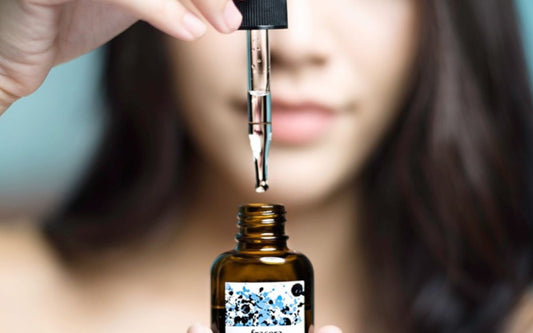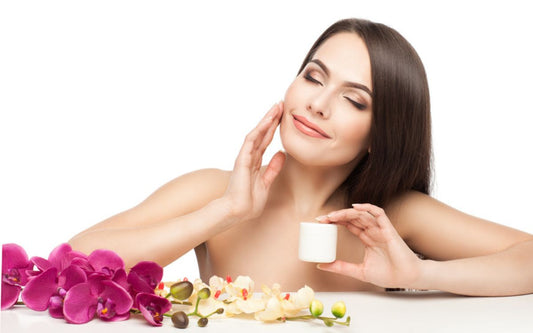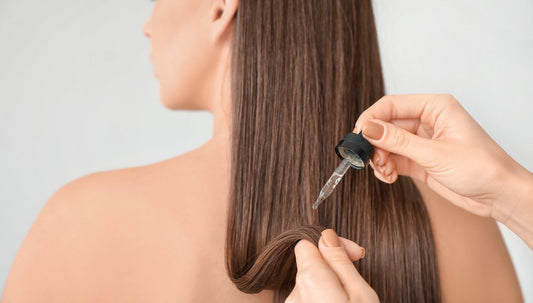Need a skin improving serum or cream? You won’t really see the results you’re after until you figure out which ingredients actually work for your skin.
So, the first step in achieving healthy, radiant skin is selecting the appropriate skincare products. It is easy to feel overwhelmed by the sheer number of options available. Yet, it can make a world of difference to know which ingredients work. If you're trying to improve your skincare routine for whatever reason—fighting signs of age, acne, or simply seeking that beautiful glow—the top skincare ingredients can make a huge amount of impact.
In this blog, we’re diving into the top 08 ingredients you should look for in your products, so you can make smart choices on your skincare journey.
Top Dermatologist-Recommended Skin Care Ingredients
Here are the best natural ingredients for skin that dermatologist Dr. Sam Ellis recommends.
1. The Power of Retinaldehyde (Retinal)
One of the top skincare ingredients is retinaldehyde, also known as retinal. Retinaldehyde is part of the retinoid family, which includes other vitamin A-derived molecules like retinol and retinoic acid. When applied topically, retinoids increase the rate of cellular turnover and help prevent and correct signs of premature skin aging, such as fine lines, wrinkles, irregular pigmentation, and dullness.
Benefits of Retinaldehyde
- Potency: Retinaldehyde only needs one conversion step to become retinoic acid (the active form), making it more potent and faster-acting compared to retinol, which requires two steps and loses some effectiveness along the way.
- Irritation: It's stronger than retinol but less irritating than prescription retinoids like tretinoin, making it a great choice for sensitive skin.
- Product Tint: Retinaldehyde products often have a yellow, orange, or green tint due to the natural color of the ingredient.
- Formulation: Brands need to carefully formulate retinaldehyde products to maintain their stability and reduce irritation potential.
Dr. Sam Ellis recommends two of the best skin care products:
- Medik8 Crystal Retinal
- Misty Antiaging Serum - 1% Retinol
2. The Acne-Fighting Power of Benzoyl Peroxide
Another top skincare ingredient is benzoyl peroxide. Benzoyl peroxide is one of the go-to acne-fighting ingredients, and it works in multiple ways to combat breakouts.
Benzoyl peroxide is anti-inflammatory, meaning it helps reduce redness and swelling. It also destroys acne-causing bacteria, is sebostatic (reduces excess oil production), and is keratolytic (breaks apart the sticky skin cells that can clog pores and lead to blackheads and whiteheads).
Dr. Sam Ellis says that, “When it comes to benzoyl peroxide concentrations, my preference is for products that contain 5% or less. Studies have shown that higher strengths don't provide added efficacy but can lead to increased irritation for some people.”
Precautions
It's important to note that benzoyl peroxide can bleach fabrics, so be sure to fully rinse it off and use white or light-colored towels, sheets, and clothing when first incorporating it into your routine.
3. The Skin-Loving Benefits of L-Ascorbic Acid (Vitamin C)
Another of the best ingredients for skin repair is l-ascorbic acid, also known as vitamin C. L-ascorbic acid is the most studied form of vitamin C and the bioactive form that our skin recognizes and utilizes.
Vitamin C is a powerful antioxidant that helps protect the skin against free radical damage from environmental exposures like pollution and UV radiation. It also increases collagen synthesis, decreases collagen destruction, and helps prevent hyperpigmentation.
Before you confuse vitamin C and L-ascorbic acid, let me make it clear to you:
Difference Between Vitamin C and L-ascorbic Acid
L-Ascorbic Acid: This is the pure, active form of vitamin C. It’s the most potent and effective form for skincare because it’s directly involved in the skin's processes. It can be found in a wide range of concentrations, from under 1% to over 20%. The tricky part about formulating with l-ascorbic acid is that it can oxidize and become less effective when exposed to light, air, or water. Brands need to carefully package and preserve their l-ascorbic acid products to maintain their potency.
Vitamin C: This term refers to the broader category of compounds that include ascorbic acid and its derivatives. Vitamin C encompasses various forms, including L-ascorbic acid, as well as other stable forms like ascorbyl palmitate, magnesium ascorbyl phosphate, and sodium ascorbyl phosphate. These derivatives are often used in skincare products because they are more stable and less likely to degrade over time compared to L-ascorbic acid.
Two of the most popular vitamin C serums are:
- Misty Glowing Serum - Vitamin E
- Maelove The Glow Maker
Moreover, you can find plenty of the best serums for glowing skin in Pakistan. Just make sure to choose carefully and check which type of vitamin C derivatives are in the serum.
4. The Versatility of Azelaic Acid
Another best ingredients for skin repair is azelaic acid. Azelaic acid is a dicarboxylic acid that's different from the more commonly known alpha hydroxy acids and beta hydroxy acids.
Azelaic acid is a skin-balancing ingredient that inhibits the enzyme tyrosinase, which is responsible for pigment production. This makes it helpful for addressing hyperpigmentation. It's also an antioxidant and antimicrobial, making it beneficial for conditions like acne and rosacea.
Azelaic acid is considered safe to use during pregnancy, which is why it's a common prescription for pregnant women dealing with acne or rosacea.
5. The Underrated Power of Sulfur
Sulfur is another ingredient that I think deserves more love. Sulfur is a natural element that's incredibly versatile - it helps reduce sebum production, is keratolytic (breaks apart sticky skin cells), and has anti-inflammatory, antibacterial, and antifungal properties.
Sulfur is used off-label to treat a variety of skin conditions, including acne, rosacea, psoriasis, and eczema. Its main side effect is dryness, which can lead to irritation, but for oily skin types, sulfur can be a game-changer.
6. The Hydrating Power of Glycerin
Glycerin is another dermatologist-recommended skin care ingredient that deserves more recognition. At its core, glycerin is a humectant, meaning it draws water from the air into the top layers of the skin. This helps with hydration, plumpness, and skin elasticity. You may have seen this ingredient in almost every skin care product in Pakistan.
Glycerin can be effective at a wide range of concentrations, but when it's over 20%, it's considered a skincare active. Higher concentrations of glycerin can feel a bit sticky or tacky, which is why I tend to prefer them in wash-off products like cleansers.
In cleansers, glycerin acts as a skin protectant, preventing the surfactants from stripping the skin's natural fats and lipids. This leaves the skin feeling clean but not depleted.
7. The Combined Power of Niacinamide And Hyaluronic Acid
If you are using any serum or cream that contains both niacinamide and hyaluronic acid together, it can offer a powerful skincare boost.
Niacinamide is an active form of vitamin B3 (niacin). It is a versatile ingredient praised for its ability to improve skin texture and tone. This amazing ingredient reduces inflammation, minimizes pores, and strengthens the skin barrier. You can use niacinamide with retinoid or other acids because it is generally well-tolerated.
Hyaluronic acid is a naturally occurring polysaccharide in the skin that is called a hydrating powerhouse. It retains moisture, reduces fine lines, and boosts elasticity.
So, you may choose the products containing these two ingredients because these ingredients can be used effectively with other acids and ingredients.
8. The Skin-Protecting Power of Petrolatum (Petroleum Jelly)
Another top skincare ingredient is petrolatum, more commonly known as petroleum jelly or Vaseline. Petrolatum is an occlusive, meaning it traps water in the skin and prevents transepidermal water loss.
Petrolatum is considered the gold standard of occlusives, and it's so effective at protecting the skin barrier that it's often recommended as a standalone product. I frequently recommend original Vaseline to my patients for a variety of skin issues, from cuts and scrapes to post-operative wound care.
What Are The Most Common Skincare Ingredients To Avoid?
When selecting skincare products, it's crucial to be aware of skincare ingredients to avoid because they can cause irritation to your skin. Here’s a list of skincare ingredients to consider avoiding, especially if you have sensitive skin, are prone to allergic reactions, or have specific skin concerns:
- Sulfates (e.g., Sodium Lauryl Sulfate, Sodium Laureth Sulfate): They can strip the skin of its natural oils, leading to dryness and irritation.
- Synthetic Fragrances: They can cause allergic reactions, irritation, and sensitivities in some individuals. Look for products labeled “fragrance-free” or “unscented.”
- Formaldehyde and Formaldehyde-Releasing Preservatives (e.g., DMDM Hydantoin, Quaternium-15): These ingredients are known as irritants and potential carcinogens.
- Oxybenzone and Other Chemical Sunscreens (e.g., Octocrylene): These are UV filters used in sunscreens. They can cause allergic reactions and may have environmental concerns. Consider mineral sunscreens with zinc oxide or titanium dioxide instead.
- Hydroquinone: It is a skin-lightening agent. It is potentially irritating and linked to health concerns if used long-term or in high concentrations. There are safer alternatives for brightening, such as vitamin C or niacinamide.
- Retinoids (e.g., Tretinoin): are vitamin A derivatives used for anti-aging and acne treatment. It can be irritating, especially for sensitive skin, and should be used with caution in pregnancy.
- Benzoyl Peroxide (in high concentrations): It is an acne treatment ingredient. It can be very drying and irritating when used in high concentrations or on sensitive skin.
- Sodium Lauryl Sulfate (SLS): It is known for its potential to irritate and dry out the skin, particularly in sensitive individuals.
Conclusion
As you can see, we have listed the wide range of skincare ingredients that our customers love to choose from in skincare products. From powerhouse actives like retinaldehyde and vitamin C to versatile ingredients like glycerin, each of these has unique benefits that can help address a variety of skin concerns.
We encourage you to explore some of these ingredients and see how they can fit into your own skincare routine. And as always, be sure to consult with a dermatologist if you have any specific skin conditions or concerns.
Shop more of our best products here at Misty.



